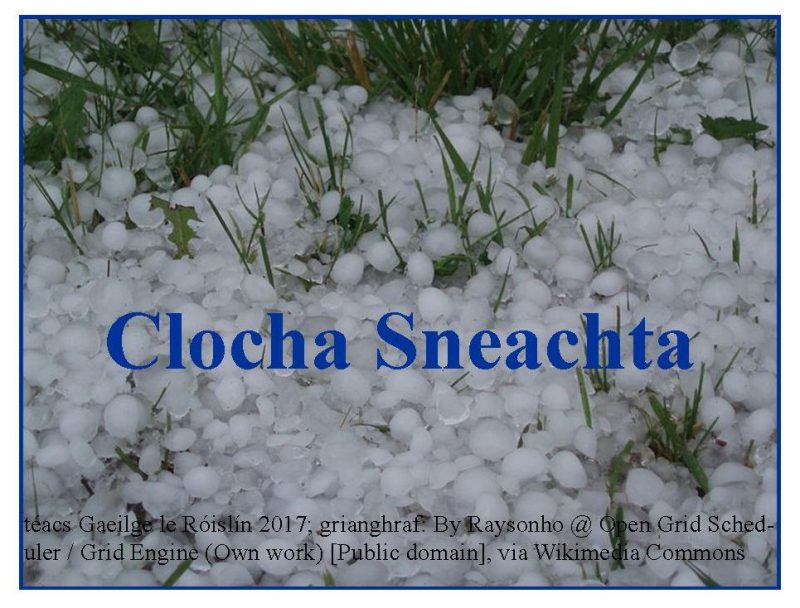Gluais don alt faoi fhrasaíocht (precipitation vocab in Irish, plus some pronunciation tips) Posted by róislín on Feb 20, 2017 in Irish Language
(le Róislín)
Our most recent blogpost (nasc thios) discussed four types of precipitation (ceithre chineál frasaíochta) and today’s post will focus on some of the less common words in that article, and, in some cases, pronunciation. So, seo dosaen focal ón bhlagmhír sin, an pictiúr agus an téacs leis san áireamh:
bunlíne, bottom line, an bhunlíne, the bottom line
cloch shneachta [klokh HNAKH-tuh, with the “s” silent], hailstone, lit. stone of snow; an chloch shneachta, the hailstone
clochraithe [KLOKH-rih-huh, with the “t” silent], petrified, based on “cloch” (stone) as “petrified” is based on “petra” (rock)
diúracán, missile; an diúracán, the missile
inchinn [IN-hyinn, with the “c” silent], brain, an inchinn, the brain, ultimately derived from “ceann” (head)
leath-thrédhearcach [LYAH-HRzAY-YARK-ukh, with the t’s and the d silent], semi-transparent, based on “leath-” (half) + “tré” (through) and “dearcach,” from “dearcadh” (sight, view). On its own, “dearcach” usually means “far-seeing” or “considerate.”
lonrach, luminous, bright, shining, brilliant, resplendent
moirtéal aoil, lime mortar, lit. mortar of lime (aol, here in the genitive case, that is, the oxide (an ocsaíd, ní an toradh!); an moirtéal aoil, the lime mortar
neamhshaolta [NYOW-HAYL-tuh OR NYOW-HEEL-tuh, with the “ow” as in “now”or “cow,” not as in “tow-truck” or “row-boat”], unworldly, otherworldy, alien, in this case, extraterrestrial. So the entire phrase in the photo caption from the recent blog then, “inchinn lonrach leath-thrédhearcach neach neamhshaolta,” means ” luminous semi-transparent brain of an alien being.” The word “neamhshaolta” itself comes from “neamh-” (non-) + saol (life, world) + –ta (an adjective ending). Seems to me that I’ve seen some neacha neamhshaolta (or eachtardomhandaigh) that look like that i scannáin agus i gcláracha teilifíse, that is (ní sa saol atá ann, nó sa saol mar a shíleann muid atá ann).
plúchadh, blanketing, charging down, obscuring, suffocating, with “blanketing” the most relevant translation for our purposes (ag plúchadh sneachta, snowing heavily)
spás amuigh [spawss uh-MWEE OR spawss uh-MUH], outer space; note that “outer” isn’t the most typical translation of “amuigh.” that would be “outside” or “outdoor(s),” used adverbially. But “amuigh” does show up as “outer” in some phrases like “outer garments” (éadaí amuigh) and “the outer side of “(an taobh amuigh de).
teanntásach, forward, bold, familiar (as in “on familiar terms with”), hail-fellow-well-met (as an adjective), also: assertive, opinionated, presumptuous, pushing, and self-confident. As for that wide range of meanings, bhuel, mar a deir an seanfhocal, “Nuair a thig cith, tig balc.” [Aistriúchán an tseanfhocail sin uait? Féach an nóta thíos]. Oh, right, this didn’t really have to do with any of the four main types of precipitation (ceithre phríomhchineál frasaíochta), rain, hail, sleet, and snow, but it had to do with the disambiguation of “hail” (“hail” as in “healthy” and “wassail” vs. “hail” as in “ice”). Disambiguation (imdhealú débhríochta) is good, too!
Tá suil agam go raibh sé seo úsáideach agus go raibh rud éigin nua don tosaitheoir ann (cloch shneachta, b’fhéidir) agus rud éigin nua don chainteoir ag ardleibhéal, (leath-thrédhearcach, mar shampla). SGF — Róislín
Nóta: Nuair a thig cith tig balc. It never rains but it pours, lit. When a shower comes, a downpour comes.
Nasc: Cineálacha Frasaíochta (Irish Terms for Types of Precipitation: Rain, Snow, Sleet, Hail) Posted by róislín on Feb 16, 2017 in Irish Language

Build vocabulary, practice pronunciation, and more with Transparent Language Online. Available anytime, anywhere, on any device.





Leave a comment: